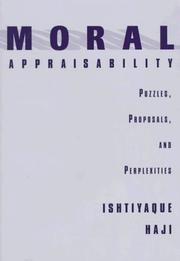| Listing 1 - 10 of 12 | << page >> |
Sort by
|
Book
ISBN: 1402090765 9048180635 9786611853518 1281853518 1402090773 Year: 2009 Publisher: [Dordrecht] : Springer,
Abstract | Keywords | Export | Availability | Bookmark
 Loading...
Loading...Choose an application
- Reference Manager
- EndNote
- RefWorks (Direct export to RefWorks)
Freedom of the sort implicated in acting freely or with free will is important to the truth of different sorts of moral judgment, such as judgments of moral responsibility and those of moral obligation. Little thought, however, has been invested into whether appraisals of good or evil presuppose free will. This important topic has not commanded the attention it deserves owing to what is perhaps a prevalent assumption that freedom leaves judgments concerning good and evil largely unaffected. The central aim of this book is to dispute this assumption by arguing for the relevance of free will to the truth of two sorts of such judgment: welfare-ranking judgments or judgments of personal well-being (when is one's life intrinsically good for the one who lives it?), and world-ranking judgments (when is a possible world intrinsically better than another?). The book also examines free will’s impact on the truth of such judgments for central issues in moral obligation and in the free will debate. This book should be of interest to those working on intrinsic value, personal well-being, moral obligation, and free will.
Ethics. --- Free will and determinism. --- Metaphysics. --- Philosophy of mind. --- Philosophy, Modern. --- Philosophy. --- Well-being. --- Philosophy --- Philosophy & Religion --- Ethics --- Well-being --- Moral and ethical aspects. --- Welfare (Personal well-being) --- Wellbeing --- Compatibilism --- Determinism and free will --- Determinism and indeterminism --- Free agency --- Freedom and determinism --- Freedom of the will --- Indeterminism --- Liberty of the will --- Modern philosophy. --- Modern Philosophy. --- Philosophy of Mind. --- Quality of life --- Happiness --- Health --- Wealth --- Determinism (Philosophy) --- Philosophy, modern. --- Mind, Philosophy of --- Mind, Theory of --- Theory of mind --- Cognitive science --- Metaphysics --- Philosophical anthropology --- Modern philosophy --- God --- Ontology --- Philosophy of mind --- Deontology --- Ethics, Primitive --- Ethology --- Moral philosophy --- Morality --- Morals --- Philosophy, Moral --- Science, Moral --- Values
Book
ISBN: 9780190260774 Year: 2016 Publisher: New York Oxford University Press
Abstract | Keywords | Export | Availability | Bookmark
 Loading...
Loading...Choose an application
- Reference Manager
- EndNote
- RefWorks (Direct export to RefWorks)
Fortune --- Free will and determinism. --- Responsibility. --- Moral and ethical aspects.

ISBN: 1280454091 0195354168 0585245649 9780585245645 9781280454097 0195114744 9780195114744 0197730930 Year: 1998 Publisher: New York Oxford University Press
Abstract | Keywords | Export | Availability | Bookmark
 Loading...
Loading...Choose an application
- Reference Manager
- EndNote
- RefWorks (Direct export to RefWorks)
Explores a central question of moral philosophy, addressing whether we are morally responsible for certain kinds of actions, intentional omissions and the consequences deriving therefrom. Haji distinguishes between moral responsibility and a more restrictive category, moral appraisability.
Ethics. --- Free will and determinism. --- Responsibility. --- Accountability --- Moral responsibility --- Obligation --- Ethics --- Supererogation --- Compatibilism --- Determinism and free will --- Determinism and indeterminism --- Free agency --- Freedom and determinism --- Freedom of the will --- Indeterminism --- Liberty of the will --- Determinism (Philosophy) --- Deontology --- Ethics, Primitive --- Ethology --- Moral philosophy --- Morality --- Morals --- Philosophy, Moral --- Science, Moral --- Philosophy --- Values --- Free will and determinism --- Responsibility
Book
ISBN: 1443853232 1299973981 9781299973985 9781443853231 1443850527 9781443850520 Year: 2013 Publisher: Cambridge Scholars Publishing
Abstract | Keywords | Export | Availability | Bookmark
 Loading...
Loading...Choose an application
- Reference Manager
- EndNote
- RefWorks (Direct export to RefWorks)
Determinism is, roughly, the thesis that facts about the past and the laws of nature entail all truths. A venerable, age-old dilemma concerning responsibility distils to this: if either determinism is true or it is not true, we lack "responsibility-grounding" control. Either determinism is true or it is not true. So, we lack responsibility-grounding control. Deprived of such control, no one is ever morally responsible for anything. A number of the freshly-minted essays in this collection address aspects of this dilemma. Responding to the horn that determinism undermines the freedom that respon
Free will and determinism. --- Responsibility. --- Accountability --- Moral responsibility --- Obligation --- Ethics --- Supererogation --- Compatibilism --- Determinism and free will --- Determinism and indeterminism --- Free agency --- Freedom and determinism --- Freedom of the will --- Indeterminism --- Liberty of the will --- Determinism (Philosophy)
Book
ISBN: 9780190050856 Year: 2019 Publisher: New York, N.Y. Oxford University Press
Abstract | Keywords | Export | Availability | Bookmark
 Loading...
Loading...Choose an application
- Reference Manager
- EndNote
- RefWorks (Direct export to RefWorks)

ISBN: 9780511498794 9780521813877 9780521039185 0511020562 9780511020568 0511498799 0521813875 1107125820 9781107125827 0521039185 0511147767 9780511147760 0511045565 9780511045561 1280434082 9781280434082 0511177437 9780511177439 051130501X Year: 2002 Publisher: New York : Cambridge University Press,
Abstract | Keywords | Export | Availability | Bookmark
 Loading...
Loading...Choose an application
- Reference Manager
- EndNote
- RefWorks (Direct export to RefWorks)
This book addresses a dilemma concerning freedom and moral obligation (obligation, right and wrong). If determinism is true, then no one has control over one's actions. If indeterminism is true, then no one has control over their actions. But it is morally obligatory, right or wrong for one to perform some action only if one has control over it. Hence, no one ever performs an action that is morally obligatory, right or wrong. The author defends the view that this dilemma can be evaded but not in a way traditional compatibilists about freedom and moral responsibility will find congenial. For moral obligation is indeed incompatible with determinism but not with indeterminism. He concludes with an argument to the effect that, if determinism is true and no action is morally obligatory, right or wrong, then our world would be considerably morally impoverished as several sorts of moral appraisal would be unjustified.
Free will and determinism. --- Ethics. --- Duty. --- Deontology --- Obligation --- Responsibility --- Supererogation --- Ethics, Primitive --- Ethology --- Moral philosophy --- Morality --- Morals --- Philosophy, Moral --- Science, Moral --- Philosophy --- Values --- Compatibilism --- Determinism and free will --- Determinism and indeterminism --- Free agency --- Freedom and determinism --- Freedom of the will --- Indeterminism --- Liberty of the will --- Determinism (Philosophy) --- Arts and Humanities
Book
ISBN: 9780199899203 Year: 2012 Publisher: New York Oxford university press
Abstract | Keywords | Export | Availability | Bookmark
 Loading...
Loading...Choose an application
- Reference Manager
- EndNote
- RefWorks (Direct export to RefWorks)
Free will and determinism --- Responsibility --- Accountability --- Moral responsibility --- Obligation --- Ethics --- Supererogation --- Compatibilism --- Determinism and free will --- Determinism and indeterminism --- Free agency --- Freedom and determinism --- Freedom of the will --- Indeterminism --- Liberty of the will --- Determinism (Philosophy) --- Frankfurt, Harry G., --- פרנקפורט, הארי ג׳, --- Frankfurt, Harry Gordon, --- Free will and determinism. --- Responsibility. --- Frankfurt, Harry G.
Book
ISBN: 9780197657829 0197657826 0197657834 0197657842 0197657850 Year: 2023 Publisher: Oxford Oxford University Press
Abstract | Keywords | Export | Availability | Bookmark
 Loading...
Loading...Choose an application
- Reference Manager
- EndNote
- RefWorks (Direct export to RefWorks)
"This chapter explains the four principal issues that are explored in this book. The four items on the Putative Contrasts List summarize these issues: (1) Both moral responsibility and moral obligation require freedom but whereas, seemingly, the former does not require freedom to do otherwise, the latter does. (2) Semicompatibilism regarding responsibility (or obligation) is the thesis that even if determinism is incompatible with freedom to do otherwise, it is compatible with responsibility (or obligation). Arguably, while responsibility semicompatibilism is plausible, obligation semicompatibilism is far less tenable. (3) Externalism about responsibility or obligation is the view that how you acquire apt antecedents of action, such as beliefs, desires, and values, may influence whether you are responsible for, or are morally obligated to do, something. It appears that whereas responsibility externalism is true, there is little or no reason to believe that obligation externalism is true. (4) While obligations can change with time's passage, blameworthiness cannot. The general conclusion argued for is that the only item on this list that captures a real difference is item (3). Obligation and responsibility are far more similar to each other than items (1), (2), and (4) suggest. A chapter-by-chapter synopsis concludes the discussion"--
Duty --- Responsibility
Digital
ISBN: 9781402090776 9781402090769 Year: 2009 Publisher: Place of publication unknown Springer
Abstract | Keywords | Export | Availability | Bookmark
 Loading...
Loading...Choose an application
- Reference Manager
- EndNote
- RefWorks (Direct export to RefWorks)
Philosophy --- Metaphysics --- Psychology --- General ethics --- ethiek --- filosofie --- persoonlijkheidsleer --- metafysica
Book
ISBN: 1551119196 9781551119199 Year: 2009 Publisher: Toronto Broadview
Abstract | Keywords | Export | Availability | Bookmark
 Loading...
Loading...Choose an application
- Reference Manager
- EndNote
- RefWorks (Direct export to RefWorks)
| Listing 1 - 10 of 12 | << page >> |
Sort by
|

 Search
Search Feedback
Feedback About UniCat
About UniCat  Help
Help News
News